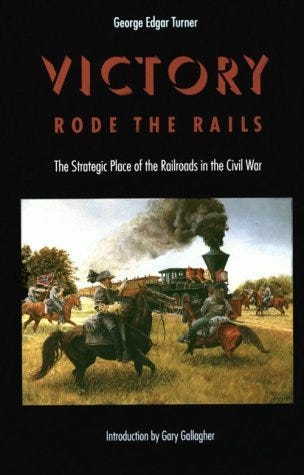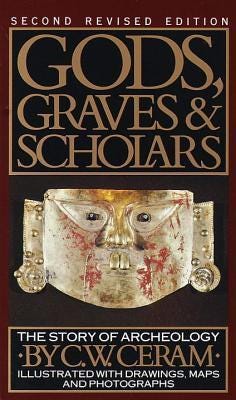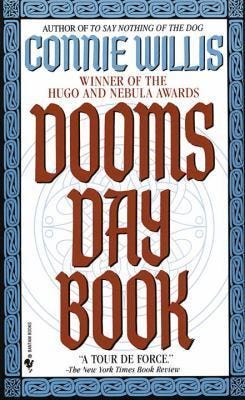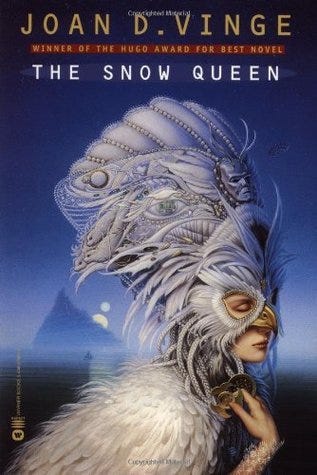Short reviews for January 2024
Victory Rode the Rails; Gods, Graves, and Scholars; Doomsday Book; The Snow Queen
Victory Rode the Rails, by George Edgar Turner (419 pp; 1953)
Who should read this? People interested in the Civil War who want details, or people who like stories of logistics.
This's the story of railroads in the Civil War: of the Confederate railroads which decayed under lack of industrial capacity (the whole Confederacy wasn't able to build a single locomotive during the war!) to failure, and of the Union railroads which grew from triumph to triumph both of the private lines (which expanded under the new traffic demands) and the US Military Railroad.
As Turner repeatedly mentions, he's not telling the story of the war but of the railroads. Here, McClellan's initial thoughts of advancing south toward Fredericksburg loom larger than his eventual Peninsular Campaign, because the US Military Railroad was birthed to support those initial thoughts - reconstructing the line south from Aquia Creek (destroyed by the Confederates) in record time. Turner knows his story and sticks to it.
I came to this book out of interest in the US Military Railroad (being inspired by its prominent role in Newt Gingrich's _Gettysburg_ alternate history trilogy), and that was richly repaid. Under the genius of Gen. Herman Haupt, they rebuilt lines in record time and kept them running at unbelievable capacity to supply the armies. Meanwhile, the Confederate lines suffered such that Lee was forced to abandon offensives due to starving soldiers even when camped right on a railhead, with ample supplies in Richmond!
As Turner calls out, this was vitally important to the Civil War. I've been struck before by the contrast between ancient foraging and modern supply lines, and this story is the missing piece.
Gods, Graves, and Scholars, by C. W. Ceram (515 pp; 1949)
Who should read this book? People who like adventure stories of archaeologists.
This book was published in 1949, so it's inevitably out of date on recent archaeological discoveries. But actually telling the story of ancient civilizations isn't its theme. It focuses, rather, on short stories of the lives and work of several different archaeologists and translators for each of several ancient civilizations.
They're well-told stories, but most individual stories are too short to get into any detail. We see the adventures and perseverance and zeal of different archaeologists, and Ceram is a good enough writer to tell them interestingly. But we don't get depth beyond adventure stories and the gradually-disclosing mystery of the ancient civilizations.
Part of me really liked this. It brings back fond memories of similar generations-old books on ancient civilizations that I'd read (in my church's library) as a teenager. But another part of me kept wishing for a different focus. Schliemann is interesting enough, but I want to hear about Troy. Carter and other archaeologists lamenting Egyptian grave robbers are interesting enough, but my interest is piqued about who the grave robbers were.
And even within the focus, I keep wondering what larger message can be taken. All these archaeologists appear monomanaically focused, and persevere past so many difficulties. Is that really how archaeology advanced - at least, before the modern era of university digs, which transition Ceram mentions briefly at the end? He doesn't say.
So, if you like adventure stories, read this book - but if you want something more, I recommend something else, probably more recent.
Doomsday Book, by Connie Willis (578 pp; 1992)
Who should read this? People who like the sound of "modern university politics and time travel to the Middle Ages" - and who don't mind a dark second half.
A future Oxford University has a time machine, and sends an enthusiastic grad student back to the Middle Ages. Only something's gone wrong - but we don't know what, because the tech running the machine who announced that fell victim to a new epidemic just afterwards. So, Oxford is thrown into chaos and quarantine. Meanwhile, she's made unexpected friends in the past, and her own plans have gone awry.
I like the combination of Willis's charming banter and more serious plot arcs. This banter would seem trivial by itself, but in this contrast I can enjoy even while (with one of our protagonists) I'm exasperated by how university politics gets wrapped up in trivialities. Willis also drops in some interestingly theological analogies, whereby our characters think briefly on the deeper significance of what they're doing... which, on reflection, is subtly woven throughout It's a beautiful full spectrum of tone.
But then, in the last part of the book, the spectrum of tone brings us its last note: things get darker. The ominous hints in the background of what went wrong with the time travel bloom to disaster, and a story of love and care that brought tears to my eyes.
The Snow Queen, by Joan Vinge (465 pp; 1980)
Who should read this? People who like cynical social sci-fi worldbuilding and don't mind a slow plot.
Our co-protagonist is an unknowing clone of the queen of a low-tech lost-and-refound colony world, who plans to use her in a plot to hold on to power as the hyperspacial gates close down for the next century. Meanwhile, our other co-protagonist, her lover, gets separated in an accident and winds up falling in love with the queen. And there's also a hunt for whale-expies who produce a life-extending substance... Vinge's plot is very convoluted and large-scale.
This Joan Vinge is the ex-wife of Vernor Vinge, one of my favorite modern science-fiction authors. If this book is a fair sample of her work, they both like large-scale plots of the type that strike me as immediately interesting. Unfortunately, she develops it very differently - even aside from the slow pace of her writing.
Vinge's worldbuilding is cynical enough to distract me from the story. On the large scale, for instance, it turns out that the queen and interstellar federation are both hiding how the whale-expies are sapient so they can keep hunting them for life-extension. On the small scale, despite all the sex and love affairs happening, the only people I saw actually loving each other are our two co-protagonists. I don't consider this inherently a bad thing in a book, but amid all this dark universe, I wanted to see some hope. Even one of our co-protagonists gets seduced (in both the physical and moral senses) by the self-interested queen. Our other co-protagonist stays well-intentioned... but for most of the book, her good intentions are limited to redeeming her lover.
There was a way in which I enjoyed this book. I did find the world very interesting. But it's more meaningful to say that I don't want to spend any more time in this world. There are sequels, but I don't plan to read them.







